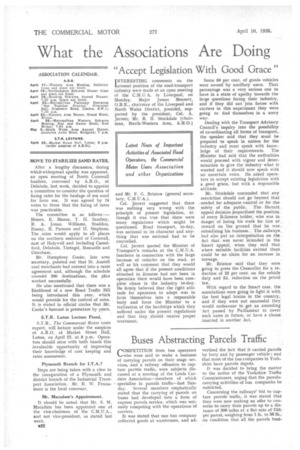"Accept Legislation With Good Grace"
Page 36

If you've noticed an error in this article please click here to report it so we can fix it.
TNTERESTING comments on the ipresent position of the road-transport industry were made at an open meeting of the C.M,U A. in Liverpool, on Monday. Major James Bennett, 0.B.E., chairman of the Liverpool and North Wales District, presided, supported by the president, Col. A. Jerrett; Mr. R. B. Stockdale (chairman, North-Western Area, A.R.O.) and Mr. F. G. Bristow (general secretary, C.M.U.A.).
Col. Jerrett suggested that there was nothing very wrong with the principle of present legislation, although it was true that there were many regulations which might be questioned. Road transport, to-day, was national in its character and anything that was national had to be controlled.
Col. jerrett quoted the Minister of Transport's remarks at the C.M.U.A. luncheon in connection with the large increase of vehicles on the road, as well as his comment that they would all agree that if the present conditions attached to licences had not been in operation there would have been complete chaos in the industry to-day. He firmly believed that the right attitude for operators to adopt was to form themselves into a responsible body and force the Minister to a realization of the hardships which they suffered under the present regulations and that they should receive proper treatment. Some 50 per cent. of goods vehicles were owned by ancillary users. That percentage was a very serious one to have in a state of apathy towards the large questions facing their industry. and if they did not join forces with carriers in this experiment they were going to find themselves in a sorry way.
Dealing with the Transport Advisory Council's inquiry into the possibility of co-ordinating all forms of transport, the speaker said that they must be prepared to speak in unison for the industry and must speak with knowledge of their requirements. The Minister had said that the authorities would proceed with vigour and determination to give the industry what it wanted and it should now speak with no uncertain voice. He asked operators to accept existing legislation with a good grace, but with a responsible attitude.
Mr. Stockdale contended that any restriction should not go beyond that needed for adequate control or for .the safety of the public. The Barratt. appeal decision jeopardized the position. of every B-licence holder, who was in danger of losing his work for hire or reward on The ground that he was subsidizing his business. The _railways had also put an interpretation on the. Act that was never intended in the Smart appeal, when they said that where suitable facilities existed there, could be no claim for an increase in tonnage.
Mr. Bristow said that they were going to press the Chancellor for a reduction of 25 per cent, on the vehicle duty and 2d. reduction on the petrol tax.
With regard to the Smart case, the associations were going to fight it with the best legal brains in the country, and if they were not successful they would endeavour to get an amending 'Act passed by Parliament to cover , such cases in future, or have a clause Inserted in another Act.




















































































